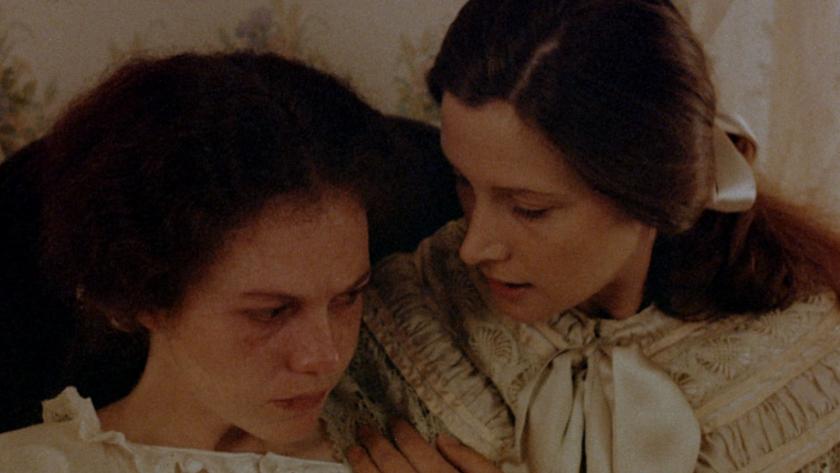Revisiting Gillian Armstrong's My Brilliant Career for the first time since I saw it in its year of release, 1979, is a mixed experience. I was close in age to its heroine and it was one of the first mainstream feature films I’d ever seen directed by a woman. At the time, it seemed incredibly exciting and inspiring and while the film is still impressive and enjoyable, it’s somewhat less radical than I remembered. The film’s glorious costumes, ornate interiors and repetitive piano score threaten to obliterate its relatively subtle feminist message: I remembered it as more radical and less a product of the heritage industry than it now appears.
Based on Miles Franklin’s 1901 novel, My Brilliant Career is the story of Sybylla, the oldest daughter of an outback farming family that has fallen on hard times. It’s a thinly veiled autobiography which became a classic text in Australia. While Sybylla dreams of being a writer, escaping the bush and living among artists in the city, her exhausted mother (who married badly) tells her that they can’t afford to keep her at home anymore and she’ll have to get work as a servant. Sybylla suffers from all the usual teenage girl self-doubt about her looks and wryly observes, “It’s bad enough being born a girl but being ugly and clever as well... ugly girls should be strangled at birth.” Played by Judy Davis, she’s very far from ugly, but the huge mane of unruly red hair and the freckle-smothered face aren’t the hallmarks of conventional beauty. Sybylla is sent off to live with her wealthy grandmother with the tacit understanding that she’s to be smartened up and married off to the most likely suitor. She’s also indentured to another impoverished farming family to tutor their wild children.
 The narrative follows her being courted first by an unappealing “jackaroo” (an Englishman sent out to the colonies) and then by the infinitely more desirable Harry Beecham (Sam Neill). Their courtship blows hot and cold, with Sybylla’s tomboyish behaviour both attracting him and shocking her social circle. She falls in love with Harry but struggles with relinquishing her dream of a creative career and settling instead for a lifetime spent producing babies on some remote farm.
The narrative follows her being courted first by an unappealing “jackaroo” (an Englishman sent out to the colonies) and then by the infinitely more desirable Harry Beecham (Sam Neill). Their courtship blows hot and cold, with Sybylla’s tomboyish behaviour both attracting him and shocking her social circle. She falls in love with Harry but struggles with relinquishing her dream of a creative career and settling instead for a lifetime spent producing babies on some remote farm.
The story plays out against a beautifully composed backdrop of lavish interiors, luscious gardens and glimpses of the harsher, sand- and mud-dominated landscape of the outback. Wonderful cinematography by Donald McAlpine uses golden-hour lighting for key romantic scenes but also captures the violent windstorms, verdant lawns and sheer strangeness of the Australian landscape. High contrasts between indoor and outdoor life are superbly conveyed by interior tracking shots which capture the work going on outside. This new Criterion edition showcases the excellent restoration done by the NSFA in 2018. It also has an engaging interview with veteran production designer Luciana Arrighi who describes how for inspiration she drew on the paintings not just of Australian landscape artists like Arthur Streeton and Tom Roberts but also French impressionists Claude Monet and Edouard Vuillard.
Armstrong is rightly proud of the feminist message in 'My Brilliant Career' and its inspiration for the antipodean directors who followed her
Another bonus is a lively interview with director Gillian Armstrong, who describes making the film fresh out of film-school. She identified heavily with its heroine and was brought to the project by producer Margaret Fink when the Australian film industry was in its heritage phase (Picnic at Hanging Rock and The Getting of Wisdom had been recent hits). Fink had bought the rights to Franklin’s book many years before and had at one point wanted Roman Polanski to direct it (he made Tess instead).
Armstrong’s student film, a short black-and-white drama set in a shoe factory in the ‘30s with its heroine enduring a backstreet abortion, is included in this edition. Armstrong is rightly proud of the feminist message in My Brilliant Career and its inspiration for the antipodean directors who followed her, Joyce Moorhouse and Jane Campion. The filmmaker is also startlingly honest about how much its star doesn’t like the film; she made the mistake of showing Judy Davis the rushes and she didn’t like her own performance and found it emotionally disturbing to see herself on screen. Criterion have also included a very ropy French TV interview with Davis filmed in 1980, where the actress comes over as impressively diffident and wary of the drippy interviewer. It’s worth watching if only to compare the appalling quality of the illustrative clips used with the excellent restoration for this edition.
Watch the trailer for the restoration of My Brilliant Career















Add comment